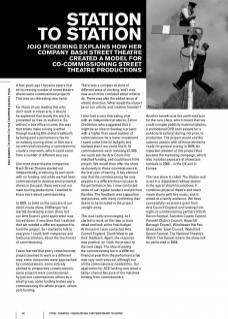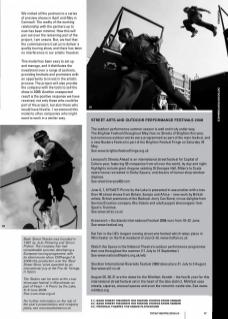A few years ago I became aware that an increasing number of street theatre shows were commissioned projects. This was an interesting new trend.
For those of you reading this who don’t work in street arts, it should be explained that mostly the work is presented as free-to-audience. So, without a box office income, the way that artists make a living is either through busking (the oldest tradition!); by being paid a performance fee for an existing touring show; or (the more recent trend) receiving a commission to create a new work, which could come from a number of different sources.
Like most street theatre companies, Bash Street Theatre started out independently, producing its own work with no funding, and while we had been commissioned to develop environmental shows in the past, these were not our main touring productions. I wanted to know more about commissioning.
In 2007, to build on the success of our silent-movie show, Cliffhanger! we started developing a new show, but our Arts Council grant application was turned down. It was then that I realised that we needed a different approach to fund the project. So I started to talk to everyone I could, both companies and festival promoters, about the mechanics of commissioning.
I soon learned that every commissioned project seemed to work in a different way; some companies were approached by commissioners, some actively pitched to prospective commissioners; some projects were commissioned by just one commissioner, others by a small group; some funding bodies were commissioning the whole project, others part-funding.
There was a complex mixture of different ways of working, and I was now even more confused about what to do. There was also the added issue of artistic direction. What would the impact be on our artistic and creative freedom?
I then had a very interesting chat with an independent producer, Simon Chatterton, who suggested that it might be an idea to develop a project with a higher than usual number of commissioners for a lower investment. I spent some time on budgets and realised that if we could find 8–10 commissioners each investing £1,500, we could ask the Arts Council for matched funding, and could launch the project. We would then offer the show exclusively to these commissioners in the first year of touring. A key element was that the commissioning fee was payable in a different financial year to the performance fee. I now contacted some of our regular bookers and pitched the idea. The feedback was supportive and positive, with many confirming their desire to be included in the project straight away.
This was really encouraging, so I started to work on the idea in more detail and look at the final budget. At this point I also contacted Arts Council England, South West to get their feedback. Again, the response was positive, so I took the project to the next stage. The idea of paying the commissioning fee in a different financial year than the performance fee was very well received, although not all the commissioners needed this. Our application for ACE funding now stood a better chance because of the matched funding from commissioners.
Another benefit was the confirmed tour for the new show, which meant that we could compile publicity material (photos, a promotional DVD and reviews for a publicity brochure) during, not prior, to production. The project would end the summer season with all these elements ready for general touring in 2009. An important element of this project thus became the marketing campaign, which also includes exposure at showcase festivals in 2008 – in the UK and in Europe.
The new show is called The Station and is set in a dilapidated railway station in the age of steam locomotives. It combines physical theatre and silent movie stunts with live music, and is aimed at a family audience. We have successfully received a grant from Arts Council England and funding from eight co-commissioning partners (North Devon Festival, Swindon County Council, Penwith District Council, Haverhill Borough Council, Winchester Hat Fair, Gloucester Town Council, Waterford Spraoi Festival, The National Theatre’s Watch This Space) where the show will be performed in 2008.
We invited all the partners to a series of preview shows in April and May in Cornwall. The reality of the working relationship with the partners up to now has been minimal. How this will pan out over the remaining part of the project, I am unsure. But, we feel that the commissioners trust us to deliver a quality touring show, and there has been no interference in our artistic freedom.
This model has been easy to set up and manage, and it distributes the investment over a range of partners, providing festivals and promoters with an opportunity to invest in the artistic process. The project will also provide the company with the tools to sell the show in 2009. Another unexpected result is the positive response we have received, not only those who could be part of the project, but also those who would have liked to. I recommend this model to other companies who might want to work in a similar way.
STREET ARTS AND OUTDOOR PERFORMANCE FESTIVALS 2008
The outdoor performance summer season is well and truly under way. The Brighton Festival (throughout May) has no Streets of Brighton this year, but numerous outdoor works were programmed as part of the main festival, and a new Buskers Festival is part of the Brighton Festival Fringe on Saturday 24 May.
See www.brightonfestivalfringe.org.uk
Liverpool’s Streets Ahead is an international street festival for Capital of Culture year, featuring 50 companies from all over the world, by day and night. Highlights include giant dragons saluting St Georges Hall, Milan’s la Scala opera house recreated in Derby Square, and dozens of human shop window displays.
See www.liverpool08.com
June 6, 7, 8 FEAST! Picnic by the Lake is presented in association with x.trax. Over 40 street shows from Britain, Europe and Africa – new work by British artists, British premieres of the Bedouin Jerry Can Band, circus delights from German/Croatian company Oko Sokolo and adult puppet shenanigans from Spain’s Trukitrek.
See www.xtrax.co.uk
Greenwich + Docklands International Festival 2008 runs from 19–22 June.
See www.festival.org
Hat Fair is the UK’s longest running street arts festival which takes place in Winchester on the first weekend of July (3–6).
www.hatfair.co.uk
Watch this Space is the National Theatre’s outdoor performance programme that runs throughout the summer (11 July to 14 September).
See www.nationaltheatre.org.uk/wts
Stockton International Riverside Festival 2008 takes place 31 July to 3 August.
See www.sirf.co.uk
August 29, 30, 31 are the dates for the Mintfest, Kendal – the fourth year for this international street festival set in the heart of the lake district. Mintfest uses streets, squares, unusual spaces and even the romantic castle site.
See www.mintfest.org
Bash Street Theatre was founded in 1991 by JoJo Pickering and Simon Pullum. The company has had considerable success developing a European touring programme with its silent-movie show Cliffhanger! In 2006 this production won the ‘Best Street Show’ prize awarded by an international jury at the Fira de Tàrrega, in Spain.
The Station can be seen at the x.trax showcase festival in Manchester as part of Feast – A Picnic by the Lake, 6–8 June 2008. See www.xtrax.org.uk
For further information on the rest of the year’s presentations and company plans, see www.bashstreet.co.uk


